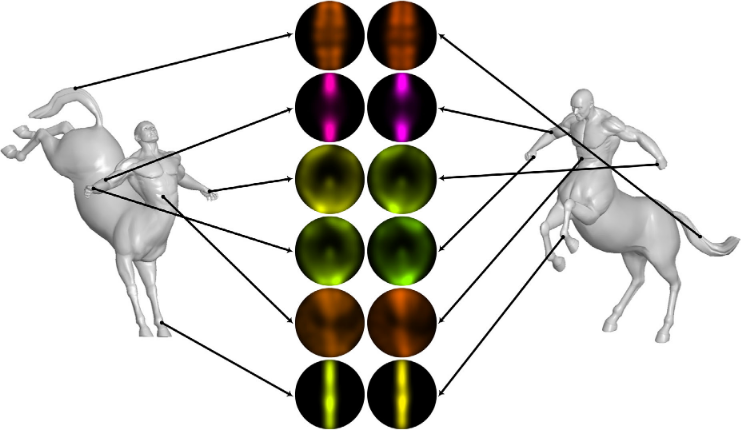ECHO: Extended Convolution Histogram of Orientations for Local Surface Description
Computer Graphics Forum, February 2021

Visualizations of biharmonic ECHO descriptors computed at corresponding points on two meshes.
Abstract
This paper presents a novel, highly distinctive and robust local surface feature descriptor. Our descriptor is predicated on a simple
observation: instead of describing the points in the vicinity of a feature point relative to a reference frame at the feature point, all
points in the region describe the feature point relative to their own frames. Isometry invariance is a byproduct of this construction.
Our descriptor is derived relative to the extended convolution – a generalization of the standard convolution that allows the filter
to adaptively transform as it passes over the domain. As such, we name our descriptor the Extended Convolution Histogram of
Orientations (ECHO). It exhibits superior performance compared to popular surface descriptors in both feature matching and
shape correspondence experiments. In particular, the ECHO descriptor is highly stable under near-isometric deformations and
remains distinctive under significant levels of noise, tessellation, complex deformations and the kinds of interference commonly
found in real data.
Paper
Supplemental Material
- ZIP file of examples on TOSCA data
Links
- Publisher's page for this paper
Citation
Thomas W. Mitchel, Szymon Rusinkiewicz, Gregory S. Chirikjian, and Michael Kazhdan.
"ECHO: Extended Convolution Histogram of Orientations for Local Surface Description."
Computer Graphics Forum 40(1):180-194, February 2021.
BibTeX
@article{Mitchel:2020:EEC,
author = "Thomas W. Mitchel and Szymon Rusinkiewicz and Gregory S. Chirikjian and
Michael Kazhdan",
title = "{ECHO}: Extended Convolution Histogram of Orientations for Local
Surface Description",
journal = "Computer Graphics Forum",
year = "2021",
month = feb,
volume = "40",
number = "1",
pages = "180--194"
}